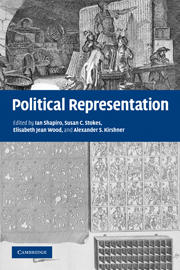Book contents
- Frontmatter
- Contents
- List of figures
- List of tables
- List of contributors
- Preface
- Editors' introduction
- Part I Representation before representative democracy
- 1 Hobbes's theory of representation: anti-democratic or proto-democratic?
- 2 Participation and representation before democracy: petitions and addresses in premodern Britain
- Part II Theories of political representation
- Part III Representation and inherited injustice
- Part IV What role for representative quotas?
- Part V Preferences, persuasion, and democratic representation
- Index
- References
1 - Hobbes's theory of representation: anti-democratic or proto-democratic?
Published online by Cambridge University Press: 05 June 2012
- Frontmatter
- Contents
- List of figures
- List of tables
- List of contributors
- Preface
- Editors' introduction
- Part I Representation before representative democracy
- 1 Hobbes's theory of representation: anti-democratic or proto-democratic?
- 2 Participation and representation before democracy: petitions and addresses in premodern Britain
- Part II Theories of political representation
- Part III Representation and inherited injustice
- Part IV What role for representative quotas?
- Part V Preferences, persuasion, and democratic representation
- Index
- References
Summary
Hobbes, representation, and democracy
Thomas Hobbes occupies a deeply ambivalent position in the history of modern conceptions of political representation. On the one hand, he is often credited as the thinker who did most to make representation a distinctively modern concept, by emancipating it from its medieval roots and employing it to establish a clear identity for the state as a separate entity in its own right (Skinner 1989, 2002). Hobbes used the idea of representation to ground a secular conception of political authority, and in doing so rescued the idea of political rule from various intractable theological controversies. In this sense, Hobbes's thought is foundational for modern theories of representative government. But for all its apparent modernity, Hobbes's theory of representation suffers from one obvious flaw when judged by the standards of contemporary politics: it appears to be strikingly anti-democratic, and it is very hard to see how an anti-democratic theory can also be viewed as foundational for the political world we now inhabit.
This dual role occupied by Hobbes – both foundational but also oppositional in his perceived relationship to representative democracy – is best captured by his treatment in what remains the most widely cited work on the theory of political representation in English, Hanna Pitkin's The Concept of Representation (Pitkin 1967). There, Hobbes is treated first of all as the thinker who did most to clarify the central feature of modern political representation – that it is an “authorization” concept (or what Pitkin goes on to call a “substantive” concept), in which political representation emerges as a form of “acting for” rather than merely “standing for.”
- Type
- Chapter
- Information
- Political Representation , pp. 15 - 34Publisher: Cambridge University PressPrint publication year: 2010
References
- 4
- Cited by

